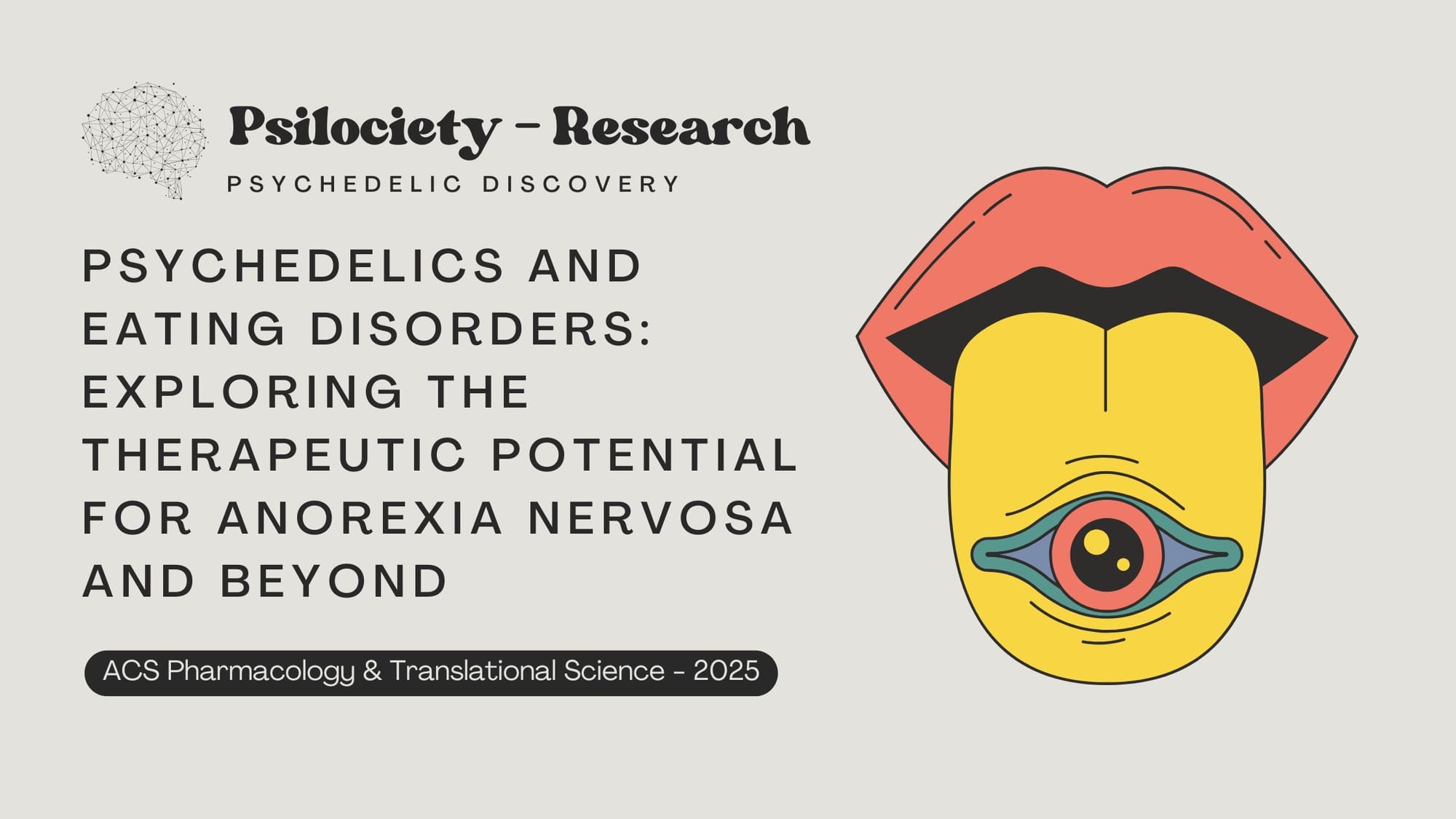Psychedelics and Eating Disorders: Exploring the Therapeutic Potential for Anorexia Nervosa and Beyond
A review of the therapeutic potential of psychedelics for anorexia nervosa, highlighting neurobiological and psychological mechanisms.

Title & Introduction
- Paper Title: Psychedelics and Eating Disorders: Exploring the Therapeutic Potential for Anorexia Nervosa and Beyond
- Published In: ACS Pharmacology & Translational Science
- Publish date: March 3, 2025
- Authors: Shuai Hu, Cong Lin, Hongshuang Wang, Xiaohui Wang
- Objective: To examine the potential therapeutic role of psychedelics, particularly psilocybin and MDMA, in treating anorexia nervosa (AN) and other eating disorders.
- Importance: Anorexia nervosa remains one of the most challenging psychiatric disorders to treat, with high morbidity and mortality rates. Traditional therapies often fail, necessitating novel approaches such as psychedelic-assisted therapy.
Summary & Takeaways
Key Takeaway: Psilocybin and MDMA show promise in treating anorexia nervosa by enhancing cognitive flexibility, disrupting maladaptive neural circuits, and facilitating emotional processing. However, more research is needed to confirm their long-term efficacy and safety.
Practical Application: Psychedelics could serve as an adjunct to existing treatments for anorexia nervosa and other eating disorders, particularly for patients unresponsive to conventional therapies.
Key Background Information
- Context: Conventional treatments for anorexia nervosa, such as cognitive-behavioral therapy (CBT) and pharmacotherapy, often yield limited success. Psychedelics offer a novel mechanism of action that could target both the psychological and neurobiological underpinnings of the disorder.
- Hypothesis: Psychedelics improve eating disorder symptoms by modulating neural circuits involved in cognitive rigidity, emotional dysregulation, and maladaptive reward processing.
Methodology
- Study Design: Narrative review of existing research and clinical trials.
- Participants: Analysis of studies involving individuals with eating disorders, particularly anorexia nervosa.
- Intervention/Exposure: Examination of psilocybin, MDMA, and other psychedelics in the treatment of AN.
- Controls: Not applicable (review article).
- Duration: Reviewed studies included both short-term and long-term assessments.
Key Findings
Primary Outcomes:
- Neurobiological Effects:
- Psychedelics disrupt maladaptive neural circuits associated with anorexia nervosa, particularly in the cortico-striato-thalamo-cortical (CSTC) pathway.
- Psilocybin reduces hyperactivity in the default mode network (DMN), promoting cognitive flexibility and reducing obsessive thought patterns.
- MDMA enhances emotional processing, potentially aiding in trauma-related aspects of eating disorders.
- Psychological Effects:
- Increased cognitive flexibility allows individuals to reconsider rigid beliefs about food, body image, and self-worth.
- Psychedelics may facilitate emotional breakthroughs and reduce anxiety around eating behaviors.
- Clinical Evidence:
- A phase 1 study using psilocybin in 10 women with anorexia nervosa showed reductions in eating disorder symptoms and improved psychological well-being.
- MDMA-assisted therapy has shown promise in individuals with comorbid PTSD and eating disorders, suggesting potential benefits for trauma-related aspects of AN.
Secondary Outcomes:
- Safety concerns include possible anxiety, nausea, and transient psychological discomfort.
- Regulatory barriers and ethical considerations remain challenges for widespread clinical use.
- Standardized treatment protocols and controlled clinical trials are necessary before psychedelics can be integrated into mainstream eating disorder treatments.
Interpretation & Implications
- Conclusion: Psychedelics, particularly psilocybin and MDMA, represent a promising new frontier for treating eating disorders, offering potential benefits for patients unresponsive to traditional therapies.
- Implications: If further validated, psychedelic-assisted therapy could be incorporated into multidisciplinary treatment programs for eating disorders.
- Limitations: Current studies have small sample sizes, and long-term effects remain unclear. Larger, controlled trials are needed to establish safety and efficacy.
Researchers & Publication
- Researchers: Shuai Hu, Cong Lin, Hongshuang Wang, Xiaohui Wang
- Publication Name: ACS Pharmacology & Translational Science
- Study URL: https://doi.org/10.1021/acsptsci.5c00094

